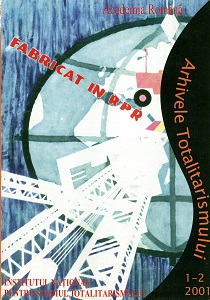Dictionar biografic
Biographical dictionary
Author(s): Florin Abraham, Ovidiu Bozgan, Nicolae Ciobanu, Adrian BrișcăSubject(s): Military history, Political history, Social history, Studies in violence and power, Pre-WW I & WW I (1900 -1919), Interwar Period (1920 - 1939), WW II and following years (1940 - 1949), Post-War period (1950 - 1989), History of Communism
Published by: Institutul National pentru Studiul Totalitarismului
Keywords: biographies; Iosif Chișinevschi; Mihai Ralea; Radu R. Rosetti; Mihail Ștefanescu;
Summary/Abstract: Iosif Chișinevschi (1905-1963) is born in Bessarabia, of the Jewish origin. Member at Communist Romanian Party in illegality at 1928, imprisoned at Galatzi and Doftana. After 1945 possessed several positions in Romanian establishment. Chișinevschi to became after the Second World War gray eminence in apparatchiks and ideological problems. In 1952 prepared, cooperatively by Miron Constantinescu and Alexandru Moghioroș, accusation against Ana Pauker-Vasile Luca group. Entering in conflict by Gheorghiu-Dej, Chișinevschi is replaced from political positions in Plenary meeting P.S.M. (June 28-29, 1957), together by Miron Constantinescu. Professor Mihai Ralea was a typical ally of the Romanian communist regime of the first years. Despite his “bourgeois” origins and his collaboration with King Carol II, whose minister has been during the rbyal dictatorship, Ralea was appointed ambassador to Washington between 1946 and 1948. Losing this position, he led various cultural institutions dealing with foreign cultural exchange. Historian, former general of the Romanian Army, Radu R. Rosetti had important contribution to Romanian historiography, concerning the military past. Member of the Romanian Academy, director of the largest library in Romania, Library of the Romanian Academy and founder of the National Army’s Museum, Radu R. Rosetti was arrested for his collaboration with Marshall Antonescu’s regime as a Minister for Education. He died in prison. Mihail Ștefanescu was military prosecutor during the World War II. During this time he prosecuted several political prisoners. After the war, he managed to escape from the accusation of war crimes and continued his job successfully under communist as military judge. In the late forties he condemned thousand of “enemy of the people”, many of them being executed. In 1950 he was arrested and convicted to 6 years imprisonment. After 5 he was excused.
Journal: Arhivele Totalitarismului
- Issue Year: IX/2001
- Issue No: 1-2
- Page Range: 233-250
- Page Count: 18
- Language: Romanian
- Content File-PDF

